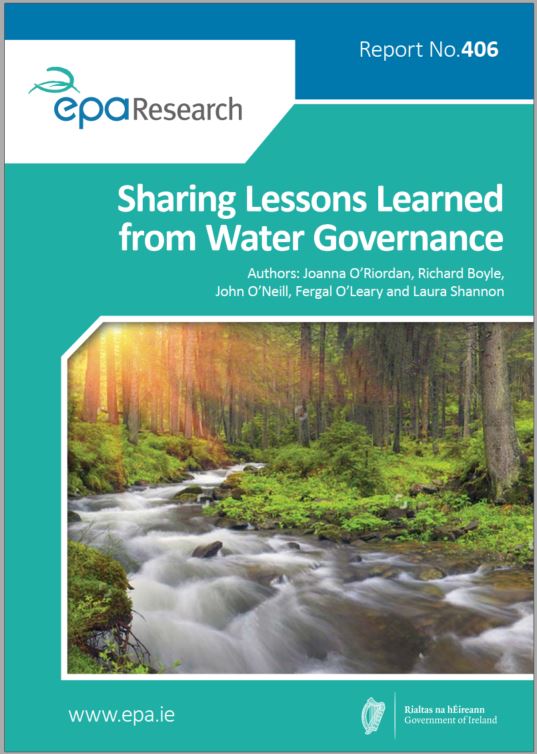Research 406: Sharing Lessons Learned from Water Governance
Authors: Joanna O’Riordan, Richard Boyle, John O’Neill, Fergal O’Leary and Laura Shannon
Summary: Clean, healthy water is essential for our economy, our aquatic wildlife and our health and wellbeing. However, as noted in the draft third-cycle River Basin Management Plan (Department of Housing, Local Government and Heritage, 2021), there are mounting environmental pressures on Ireland’s waters with the situation described as 'urgent'. The objective of this research was to review changes in structures and processes made under the second-cycle River Basin Management Plan, 2018–2021, to inform thinking regarding the third-cycle River Basin Management Plan, 2022–2027.

Project Highlights
Identifying Pressures
Clean, healthy water is essential for our economy, our aquatic wildlife and our health and wellbeing. However, as noted in the foreword to the draft third-cycle River Basin Management Plan (Department of Housing, Local Government and Heritage, 2021), there are mounting environmental pressures on Ireland’s waters with the situation described as "urgent".
A complex array of stakeholders are involved in water quality. Like many other environmental challenges, water is often described as a "wicked problem", with "wicked" denoting resistance to resolution. It is a problem for which there is no single solution and no determinable stopping point.
Informing Policy
The objective of the research carried out by the Institute of Public Administration, as part of a 2-year research programme funded by the Environmental Protection Agency, was to review changes in structures and processes made under the second-cycle River Basin Management Plan, 2018–2021, to inform thinking regarding the third-cycle River Basin Management Plan, 2022–2027. Measures on implementation and governance, which are included in Section 5 of the draft third-cycle Plan, published in September 2021, are informed by findings of the research programme. Draft governance measures proposed for the third-cycle River Basin Management Plan encompass actions with respect to the roles and responsibilities of the various implementing bodies, an enhanced programme of monitoring and reporting of progress, a greater emphasis on compliance within the full mix of regulatory approaches, a capacity-building programme to ensure the transfer of learning and knowledge, and the further activation, development and support of local-level initiatives.
Developing Solutions
A central element of the research programme has been to review water governance using experimental governance as a framework. Experimental governance is a governance model developed by academics Chuck Sabel and Jonathan Zeitlin (2012) to support the governance of so-called wicked problems. These are challenging policy issues that require a cross-government response. The complexity of these issues means that, while the ultimate goal (e.g. clean water) is clear, there is no obvious solution or pathway to achieve this goal. Rather, the solution is arrived at incrementally through an iterative process that, crucially, involves frontline and local-level stakeholders. While the water governance structures established under the second-cycle River Basin Management Plan were not set up deliberately with an experimental governance approach in mind, many tenets of experimental governance are evident in the approach. The conclusions of the research programme highlight that better structures and processes do matter, but the capacity of the public servants involved is also vital in ensuring better governance.
Related Publications
An Fóram Uisce (The Water Forum) as an Example of Stakeholder Engagement in Governance
https://www.epa.ie/media/epa-2020/research/epa-funded-research/Report-cover-406.jpg